A Comprehensive Report on Tesco's International Financial Management
VerifiedAdded on 2023/06/08
|7
|2006
|379
Report
AI Summary
This report provides a comprehensive analysis of Tesco's international financial management (IFM), emphasizing its importance in navigating global markets and handling foreign currency exchanges. It examines the challenges Tesco faces in the international market, including competition, exchange rate fluctuations, and trade tariffs. The report delves into Tesco's dividend apportionment policy, discussing relevance and irrelevance theories, and analyzes the efficient market theory in the context of Tesco, covering weak, semi-strong, and strong forms. Furthermore, it explores methods of measuring projects within Tesco, including economic, financial, and market analyses, highlighting factors such as unemployment rates, inflation, financial statement analysis, and market research. The report concludes that IFM offers significant opportunities for business growth beyond national markets, benefiting both shareholders and stakeholders through quality product manufacturing.

INTERNATIONAL
FINANCIAL
MANAGEMENT
FINANCIAL
MANAGEMENT
Paraphrase This Document
Need a fresh take? Get an instant paraphrase of this document with our AI Paraphraser
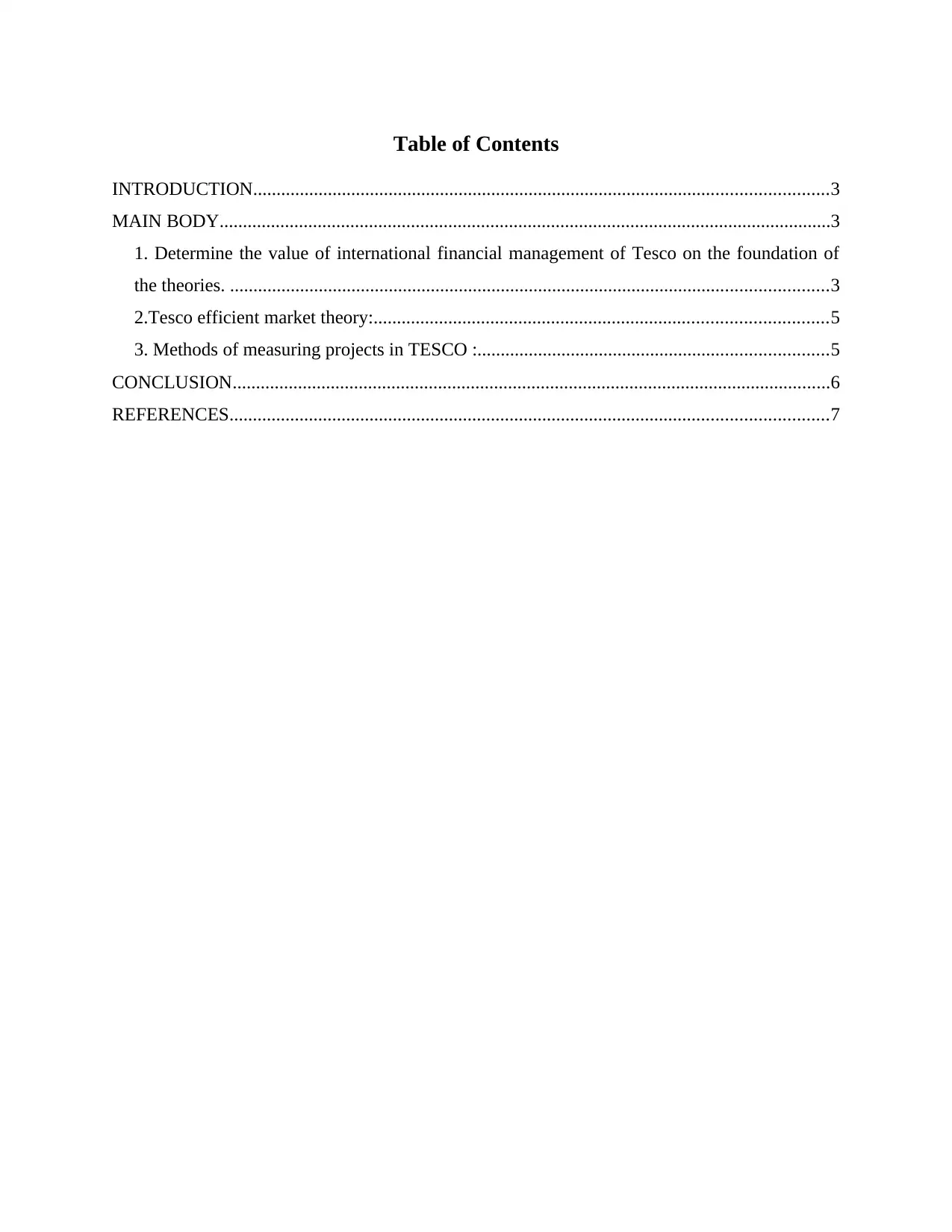
Table of Contents
INTRODUCTION...........................................................................................................................3
MAIN BODY...................................................................................................................................3
1. Determine the value of international financial management of Tesco on the foundation of
the theories. ................................................................................................................................3
2.Tesco efficient market theory:.................................................................................................5
3. Methods of measuring projects in TESCO :...........................................................................5
CONCLUSION................................................................................................................................6
REFERENCES................................................................................................................................7
INTRODUCTION...........................................................................................................................3
MAIN BODY...................................................................................................................................3
1. Determine the value of international financial management of Tesco on the foundation of
the theories. ................................................................................................................................3
2.Tesco efficient market theory:.................................................................................................5
3. Methods of measuring projects in TESCO :...........................................................................5
CONCLUSION................................................................................................................................6
REFERENCES................................................................................................................................7
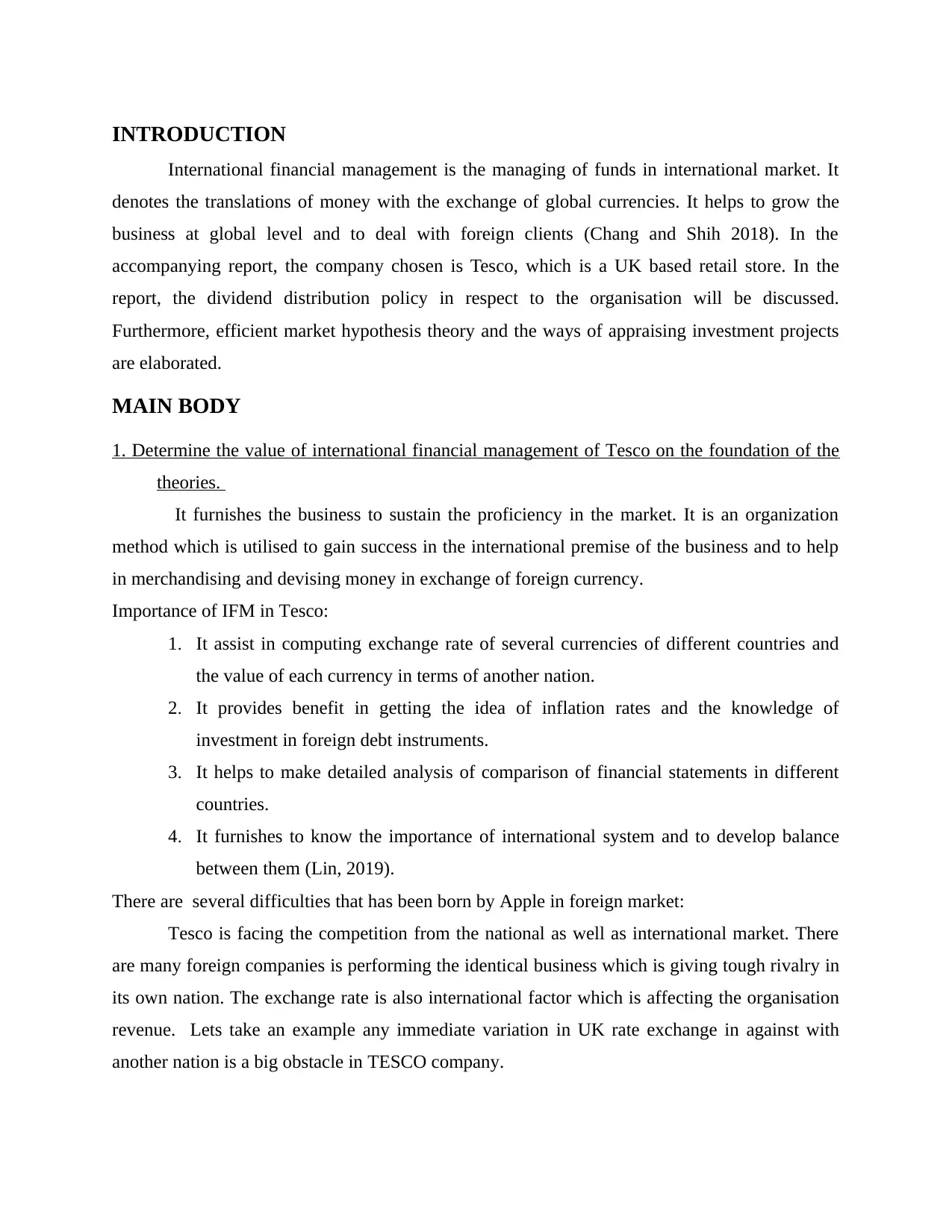
INTRODUCTION
International financial management is the managing of funds in international market. It
denotes the translations of money with the exchange of global currencies. It helps to grow the
business at global level and to deal with foreign clients (Chang and Shih 2018). In the
accompanying report, the company chosen is Tesco, which is a UK based retail store. In the
report, the dividend distribution policy in respect to the organisation will be discussed.
Furthermore, efficient market hypothesis theory and the ways of appraising investment projects
are elaborated.
MAIN BODY
1. Determine the value of international financial management of Tesco on the foundation of the
theories.
It furnishes the business to sustain the proficiency in the market. It is an organization
method which is utilised to gain success in the international premise of the business and to help
in merchandising and devising money in exchange of foreign currency.
Importance of IFM in Tesco:
1. It assist in computing exchange rate of several currencies of different countries and
the value of each currency in terms of another nation.
2. It provides benefit in getting the idea of inflation rates and the knowledge of
investment in foreign debt instruments.
3. It helps to make detailed analysis of comparison of financial statements in different
countries.
4. It furnishes to know the importance of international system and to develop balance
between them (Lin, 2019).
There are several difficulties that has been born by Apple in foreign market:
Tesco is facing the competition from the national as well as international market. There
are many foreign companies is performing the identical business which is giving tough rivalry in
its own nation. The exchange rate is also international factor which is affecting the organisation
revenue. Lets take an example any immediate variation in UK rate exchange in against with
another nation is a big obstacle in TESCO company.
International financial management is the managing of funds in international market. It
denotes the translations of money with the exchange of global currencies. It helps to grow the
business at global level and to deal with foreign clients (Chang and Shih 2018). In the
accompanying report, the company chosen is Tesco, which is a UK based retail store. In the
report, the dividend distribution policy in respect to the organisation will be discussed.
Furthermore, efficient market hypothesis theory and the ways of appraising investment projects
are elaborated.
MAIN BODY
1. Determine the value of international financial management of Tesco on the foundation of the
theories.
It furnishes the business to sustain the proficiency in the market. It is an organization
method which is utilised to gain success in the international premise of the business and to help
in merchandising and devising money in exchange of foreign currency.
Importance of IFM in Tesco:
1. It assist in computing exchange rate of several currencies of different countries and
the value of each currency in terms of another nation.
2. It provides benefit in getting the idea of inflation rates and the knowledge of
investment in foreign debt instruments.
3. It helps to make detailed analysis of comparison of financial statements in different
countries.
4. It furnishes to know the importance of international system and to develop balance
between them (Lin, 2019).
There are several difficulties that has been born by Apple in foreign market:
Tesco is facing the competition from the national as well as international market. There
are many foreign companies is performing the identical business which is giving tough rivalry in
its own nation. The exchange rate is also international factor which is affecting the organisation
revenue. Lets take an example any immediate variation in UK rate exchange in against with
another nation is a big obstacle in TESCO company.
⊘ This is a preview!⊘
Do you want full access?
Subscribe today to unlock all pages.

Trusted by 1+ million students worldwide
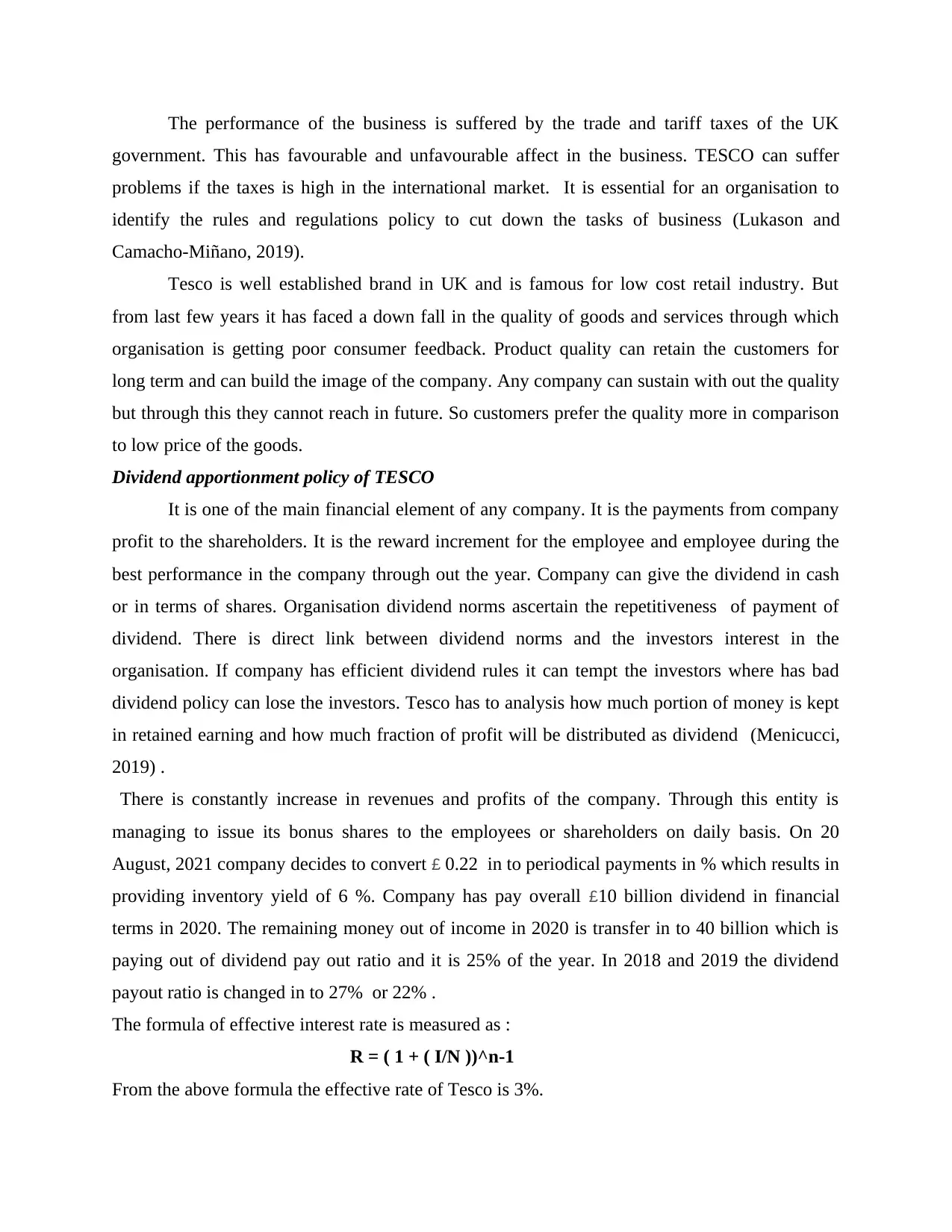
The performance of the business is suffered by the trade and tariff taxes of the UK
government. This has favourable and unfavourable affect in the business. TESCO can suffer
problems if the taxes is high in the international market. It is essential for an organisation to
identify the rules and regulations policy to cut down the tasks of business (Lukason and
Camacho-Miñano, 2019).
Tesco is well established brand in UK and is famous for low cost retail industry. But
from last few years it has faced a down fall in the quality of goods and services through which
organisation is getting poor consumer feedback. Product quality can retain the customers for
long term and can build the image of the company. Any company can sustain with out the quality
but through this they cannot reach in future. So customers prefer the quality more in comparison
to low price of the goods.
Dividend apportionment policy of TESCO
It is one of the main financial element of any company. It is the payments from company
profit to the shareholders. It is the reward increment for the employee and employee during the
best performance in the company through out the year. Company can give the dividend in cash
or in terms of shares. Organisation dividend norms ascertain the repetitiveness of payment of
dividend. There is direct link between dividend norms and the investors interest in the
organisation. If company has efficient dividend rules it can tempt the investors where has bad
dividend policy can lose the investors. Tesco has to analysis how much portion of money is kept
in retained earning and how much fraction of profit will be distributed as dividend (Menicucci,
2019) .
There is constantly increase in revenues and profits of the company. Through this entity is
managing to issue its bonus shares to the employees or shareholders on daily basis. On 20
August, 2021 company decides to convert £ 0.22 in to periodical payments in % which results in
providing inventory yield of 6 %. Company has pay overall £10 billion dividend in financial
terms in 2020. The remaining money out of income in 2020 is transfer in to 40 billion which is
paying out of dividend pay out ratio and it is 25% of the year. In 2018 and 2019 the dividend
payout ratio is changed in to 27% or 22% .
The formula of effective interest rate is measured as :
R = ( 1 + ( I/N ))^n-1
From the above formula the effective rate of Tesco is 3%.
government. This has favourable and unfavourable affect in the business. TESCO can suffer
problems if the taxes is high in the international market. It is essential for an organisation to
identify the rules and regulations policy to cut down the tasks of business (Lukason and
Camacho-Miñano, 2019).
Tesco is well established brand in UK and is famous for low cost retail industry. But
from last few years it has faced a down fall in the quality of goods and services through which
organisation is getting poor consumer feedback. Product quality can retain the customers for
long term and can build the image of the company. Any company can sustain with out the quality
but through this they cannot reach in future. So customers prefer the quality more in comparison
to low price of the goods.
Dividend apportionment policy of TESCO
It is one of the main financial element of any company. It is the payments from company
profit to the shareholders. It is the reward increment for the employee and employee during the
best performance in the company through out the year. Company can give the dividend in cash
or in terms of shares. Organisation dividend norms ascertain the repetitiveness of payment of
dividend. There is direct link between dividend norms and the investors interest in the
organisation. If company has efficient dividend rules it can tempt the investors where has bad
dividend policy can lose the investors. Tesco has to analysis how much portion of money is kept
in retained earning and how much fraction of profit will be distributed as dividend (Menicucci,
2019) .
There is constantly increase in revenues and profits of the company. Through this entity is
managing to issue its bonus shares to the employees or shareholders on daily basis. On 20
August, 2021 company decides to convert £ 0.22 in to periodical payments in % which results in
providing inventory yield of 6 %. Company has pay overall £10 billion dividend in financial
terms in 2020. The remaining money out of income in 2020 is transfer in to 40 billion which is
paying out of dividend pay out ratio and it is 25% of the year. In 2018 and 2019 the dividend
payout ratio is changed in to 27% or 22% .
The formula of effective interest rate is measured as :
R = ( 1 + ( I/N ))^n-1
From the above formula the effective rate of Tesco is 3%.
Paraphrase This Document
Need a fresh take? Get an instant paraphrase of this document with our AI Paraphraser
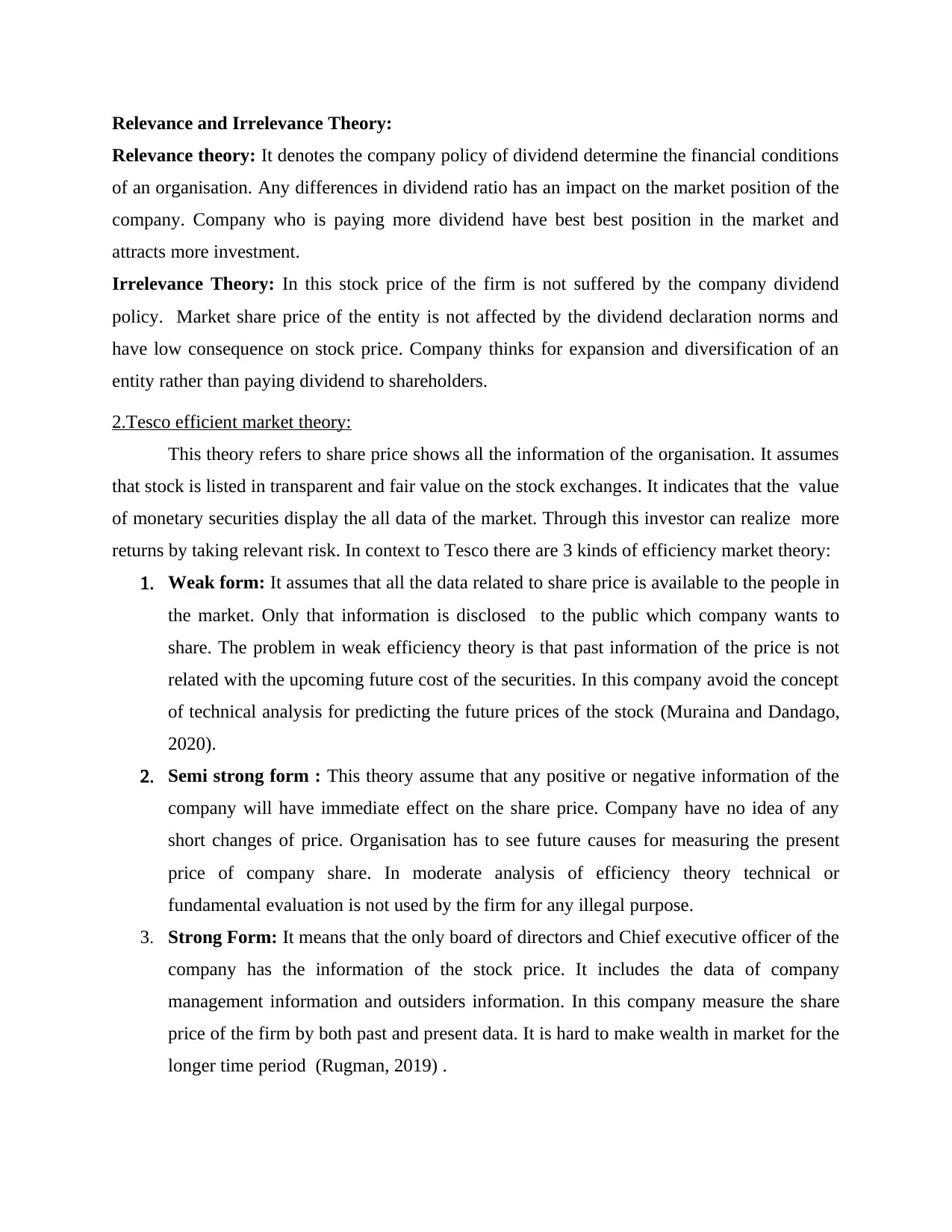
Relevance and Irrelevance Theory:
Relevance theory: It denotes the company policy of dividend determine the financial conditions
of an organisation. Any differences in dividend ratio has an impact on the market position of the
company. Company who is paying more dividend have best best position in the market and
attracts more investment.
Irrelevance Theory: In this stock price of the firm is not suffered by the company dividend
policy. Market share price of the entity is not affected by the dividend declaration norms and
have low consequence on stock price. Company thinks for expansion and diversification of an
entity rather than paying dividend to shareholders.
2.Tesco efficient market theory:
This theory refers to share price shows all the information of the organisation. It assumes
that stock is listed in transparent and fair value on the stock exchanges. It indicates that the value
of monetary securities display the all data of the market. Through this investor can realize more
returns by taking relevant risk. In context to Tesco there are 3 kinds of efficiency market theory:
1. Weak form: It assumes that all the data related to share price is available to the people in
the market. Only that information is disclosed to the public which company wants to
share. The problem in weak efficiency theory is that past information of the price is not
related with the upcoming future cost of the securities. In this company avoid the concept
of technical analysis for predicting the future prices of the stock (Muraina and Dandago,
2020).
2. Semi strong form : This theory assume that any positive or negative information of the
company will have immediate effect on the share price. Company have no idea of any
short changes of price. Organisation has to see future causes for measuring the present
price of company share. In moderate analysis of efficiency theory technical or
fundamental evaluation is not used by the firm for any illegal purpose.
3. Strong Form: It means that the only board of directors and Chief executive officer of the
company has the information of the stock price. It includes the data of company
management information and outsiders information. In this company measure the share
price of the firm by both past and present data. It is hard to make wealth in market for the
longer time period (Rugman, 2019) .
Relevance theory: It denotes the company policy of dividend determine the financial conditions
of an organisation. Any differences in dividend ratio has an impact on the market position of the
company. Company who is paying more dividend have best best position in the market and
attracts more investment.
Irrelevance Theory: In this stock price of the firm is not suffered by the company dividend
policy. Market share price of the entity is not affected by the dividend declaration norms and
have low consequence on stock price. Company thinks for expansion and diversification of an
entity rather than paying dividend to shareholders.
2.Tesco efficient market theory:
This theory refers to share price shows all the information of the organisation. It assumes
that stock is listed in transparent and fair value on the stock exchanges. It indicates that the value
of monetary securities display the all data of the market. Through this investor can realize more
returns by taking relevant risk. In context to Tesco there are 3 kinds of efficiency market theory:
1. Weak form: It assumes that all the data related to share price is available to the people in
the market. Only that information is disclosed to the public which company wants to
share. The problem in weak efficiency theory is that past information of the price is not
related with the upcoming future cost of the securities. In this company avoid the concept
of technical analysis for predicting the future prices of the stock (Muraina and Dandago,
2020).
2. Semi strong form : This theory assume that any positive or negative information of the
company will have immediate effect on the share price. Company have no idea of any
short changes of price. Organisation has to see future causes for measuring the present
price of company share. In moderate analysis of efficiency theory technical or
fundamental evaluation is not used by the firm for any illegal purpose.
3. Strong Form: It means that the only board of directors and Chief executive officer of the
company has the information of the stock price. It includes the data of company
management information and outsiders information. In this company measure the share
price of the firm by both past and present data. It is hard to make wealth in market for the
longer time period (Rugman, 2019) .
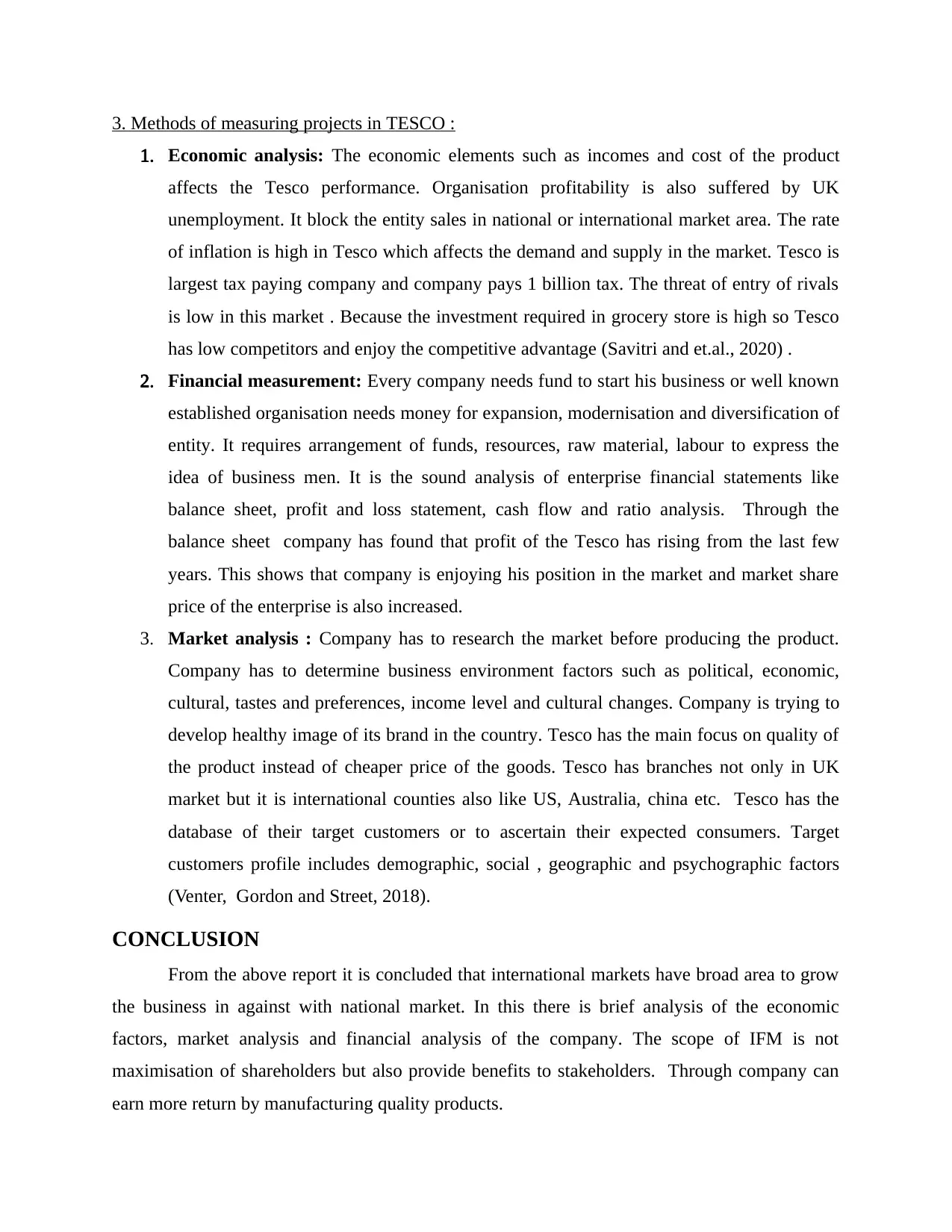
3. Methods of measuring projects in TESCO :
1. Economic analysis: The economic elements such as incomes and cost of the product
affects the Tesco performance. Organisation profitability is also suffered by UK
unemployment. It block the entity sales in national or international market area. The rate
of inflation is high in Tesco which affects the demand and supply in the market. Tesco is
largest tax paying company and company pays 1 billion tax. The threat of entry of rivals
is low in this market . Because the investment required in grocery store is high so Tesco
has low competitors and enjoy the competitive advantage (Savitri and et.al., 2020) .
2. Financial measurement: Every company needs fund to start his business or well known
established organisation needs money for expansion, modernisation and diversification of
entity. It requires arrangement of funds, resources, raw material, labour to express the
idea of business men. It is the sound analysis of enterprise financial statements like
balance sheet, profit and loss statement, cash flow and ratio analysis. Through the
balance sheet company has found that profit of the Tesco has rising from the last few
years. This shows that company is enjoying his position in the market and market share
price of the enterprise is also increased.
3. Market analysis : Company has to research the market before producing the product.
Company has to determine business environment factors such as political, economic,
cultural, tastes and preferences, income level and cultural changes. Company is trying to
develop healthy image of its brand in the country. Tesco has the main focus on quality of
the product instead of cheaper price of the goods. Tesco has branches not only in UK
market but it is international counties also like US, Australia, china etc. Tesco has the
database of their target customers or to ascertain their expected consumers. Target
customers profile includes demographic, social , geographic and psychographic factors
(Venter, Gordon and Street, 2018).
CONCLUSION
From the above report it is concluded that international markets have broad area to grow
the business in against with national market. In this there is brief analysis of the economic
factors, market analysis and financial analysis of the company. The scope of IFM is not
maximisation of shareholders but also provide benefits to stakeholders. Through company can
earn more return by manufacturing quality products.
1. Economic analysis: The economic elements such as incomes and cost of the product
affects the Tesco performance. Organisation profitability is also suffered by UK
unemployment. It block the entity sales in national or international market area. The rate
of inflation is high in Tesco which affects the demand and supply in the market. Tesco is
largest tax paying company and company pays 1 billion tax. The threat of entry of rivals
is low in this market . Because the investment required in grocery store is high so Tesco
has low competitors and enjoy the competitive advantage (Savitri and et.al., 2020) .
2. Financial measurement: Every company needs fund to start his business or well known
established organisation needs money for expansion, modernisation and diversification of
entity. It requires arrangement of funds, resources, raw material, labour to express the
idea of business men. It is the sound analysis of enterprise financial statements like
balance sheet, profit and loss statement, cash flow and ratio analysis. Through the
balance sheet company has found that profit of the Tesco has rising from the last few
years. This shows that company is enjoying his position in the market and market share
price of the enterprise is also increased.
3. Market analysis : Company has to research the market before producing the product.
Company has to determine business environment factors such as political, economic,
cultural, tastes and preferences, income level and cultural changes. Company is trying to
develop healthy image of its brand in the country. Tesco has the main focus on quality of
the product instead of cheaper price of the goods. Tesco has branches not only in UK
market but it is international counties also like US, Australia, china etc. Tesco has the
database of their target customers or to ascertain their expected consumers. Target
customers profile includes demographic, social , geographic and psychographic factors
(Venter, Gordon and Street, 2018).
CONCLUSION
From the above report it is concluded that international markets have broad area to grow
the business in against with national market. In this there is brief analysis of the economic
factors, market analysis and financial analysis of the company. The scope of IFM is not
maximisation of shareholders but also provide benefits to stakeholders. Through company can
earn more return by manufacturing quality products.
⊘ This is a preview!⊘
Do you want full access?
Subscribe today to unlock all pages.

Trusted by 1+ million students worldwide

REFERENCES
Books and Journals
Chang, S.H. and Shih, C.P., 2018. The Influence and Application of Artificial Intelligence
&Blockchain on Financial Service. HOLISTICA–Journal of Business and Public
Administration. 9(3). pp.45-54.
Lin, P., 2019. Design and implementation of financial accounting information management
system of shipping companies based on ERP. Journal of Coastal Research. 94(SI).
pp.470-474.
Lukason, and Camacho-Miñano, M.D.M., 2019. Bankruptcy risk, its financial determinants and
reporting delays: Do managers have anything to hide? Risks. 7(3). p.77.
Menicucci, E., 2019.Earnings quality: Definitions, measures, and financial reporting. Springer
Nature.
Muraina, S.A. and Dandago, K.I., 2020. Effects of implementation of International Public Sector
Accounting Standards on Nigeria’s financial reporting quality. International Journal of
Public Sector Management.
Rugman, A.M., 2019. From globalisation to regionalism: The foreign direct investment
dimension of international finance. In Shaping a new international financial system. (pp.
203-219). Routledge.
Savitri, E., and et al., 2020. Corporate governance mechanism and financial performance: Role
of earnings management. Entrepreneurship and Sustainability Issues. 7(4). p.3395.
Venter, E.R., Gordon, E.A. and Street, D.L., 2018. The role of accounting and the accountancy
profession in economic development: a research agenda. Journal of International
Financial Management & Accounting. 29(2). pp.195-218.
Books and Journals
Chang, S.H. and Shih, C.P., 2018. The Influence and Application of Artificial Intelligence
&Blockchain on Financial Service. HOLISTICA–Journal of Business and Public
Administration. 9(3). pp.45-54.
Lin, P., 2019. Design and implementation of financial accounting information management
system of shipping companies based on ERP. Journal of Coastal Research. 94(SI).
pp.470-474.
Lukason, and Camacho-Miñano, M.D.M., 2019. Bankruptcy risk, its financial determinants and
reporting delays: Do managers have anything to hide? Risks. 7(3). p.77.
Menicucci, E., 2019.Earnings quality: Definitions, measures, and financial reporting. Springer
Nature.
Muraina, S.A. and Dandago, K.I., 2020. Effects of implementation of International Public Sector
Accounting Standards on Nigeria’s financial reporting quality. International Journal of
Public Sector Management.
Rugman, A.M., 2019. From globalisation to regionalism: The foreign direct investment
dimension of international finance. In Shaping a new international financial system. (pp.
203-219). Routledge.
Savitri, E., and et al., 2020. Corporate governance mechanism and financial performance: Role
of earnings management. Entrepreneurship and Sustainability Issues. 7(4). p.3395.
Venter, E.R., Gordon, E.A. and Street, D.L., 2018. The role of accounting and the accountancy
profession in economic development: a research agenda. Journal of International
Financial Management & Accounting. 29(2). pp.195-218.
1 out of 7
Related Documents
Your All-in-One AI-Powered Toolkit for Academic Success.
+13062052269
info@desklib.com
Available 24*7 on WhatsApp / Email
![[object Object]](/_next/static/media/star-bottom.7253800d.svg)
Unlock your academic potential
Copyright © 2020–2026 A2Z Services. All Rights Reserved. Developed and managed by ZUCOL.





